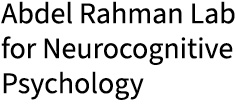New review article by Anna Kuhlen and Rasha Abdel Rahman:
Beyond speaking: neurocognitive perspectives on language production in social interaction
The human faculty to speak has evolved, so has been argued, for communicating with others and for engaging in social interactions. Hence the human cognitive system should be equipped to address the demands that social interaction places on the language production system. These demands include the need to coordinate speaking with listening, the need to integrate own (verbal) actions with the interlocutor’s actions, and the need to adapt language flexibly to the interlocutor and the social context. In order to meet these demands, core processes of language production are supported by cognitive processes that enable interpersonal coordination and social cognition. To fully understand the cognitive architecture and its neural implementation enabling humans to speak in social interaction, our understanding of how humans produce language needs to be connected to our understanding of how humans gain insights into other people’s mental states and coordinate in social interaction. This article reviews theories and neurocognitive experiments that make this connection and can contribute to advancing our understanding of speaking in social interaction.

